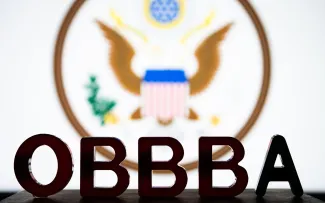
Six Key Tax Changes from the One Big Beautiful Bill Act
Signed into law on July 4th, 2025 the One Big Beautiful Bill Act includes a staggering 870 pages of provisions. Among its many components, the Act introduces several significant changes to standard deduction rules that affect both individuals and businesses.
The most notable updates include:
- Increase in the standard deduction amount.
- Introduction of a new seniors’ standard deduction provision.
- Expansion of the SALT (State and Local Tax) deduction cap.
- Addition of new car loan interest as a deductible expense.
- Deductions for tips and overtime income.
- Revised rules for charitable contribution deductions.
Increased Standard Deduction:
Single filers:
$15,000 to $15,750
Married filing jointly:
$30,000 to $31,500
Effective:
2025 onward (permanent)
Adjustment:
Amount will be adjusted annually for inflation
New Seniors’ Standard Deduction:
Age limit:
Senior taxpayers ages 65 and older
Current extra deduction:
Single filers:
$2,000
Married filing jointly:
$1,600 per person (up to $3,200 if both are 65+)
New deduction (2025–2028):
Single filers:
(adjusted gross income (AGI) ≤ $75,000): $6,000
Married filing jointly:
(AGI ≤ $150,000): $12,000
Phase-out ranges:
Single filers:
$75,000–$175,000 AGI
Married filing jointly:
$150,000–$250,000 AGI
Effective:
2025–2028
Increased State and Local Tax (SALT) Cap:
Cap increase:
$10,000 to $40,000
Qualifying income:
AGI < $500,000 (all filing statuses)
Phase-out range:
$500,000–$600,000 AGI (reverts to a limit of $10,000 after phase-out)
Adjustment:
$40,000 cap and AGI thresholds will increase by 1% every year through 2029
New Car Loan:
Eligible vehicles:
New personal use vehicles (cars, motorcycles, and other light vehicles) assembled in the United States after December 31, 2024
Deduction limit:
Up to $10,000 of interest payments yearly for qualifying loans until 2028
Phase-out ranges:
Single filers:
$100,000–$150,000 AGI
Married filing jointly:
$200,000–$250,000 AGI
Effective:
2025–2028
Deduction for Tips and Overtime:
Tips deduction:
Single filers:
Up to $25,000 in qualified tips
Married filing jointly:
Up to $50,000 if both earn qualified tips
Phase-out:
Single filers:
$150,000–$400,000 AGI
Married filing jointly:
$300,000–$550,000 AGI
Qualified tips: Voluntary and received in an occupation that customarily received tips before 2025.
Overtime deduction:
Single filers:
Up to $12,500
Married filing jointly:
Up to $25,000
Phase-out:
Single filers:
$150,000–$275,000 AGI
Married filing jointly:
$300,000–$425,000 AGI
Effective:
2025–2028
Note: Workers’ tips and overtime remain subject to payroll taxes and state income taxes, where applicable.
Charitable Deductions:
Non-itemizers:
Single filers:
Up to $1,000
Married filing jointly:
Up to $2,000
No income limit or phase-out
Itemizers:
0.5% adjusted gross income floor is implemented for charitable deductions starting in 2026, meaning only contributions exceeding that threshold will be deductible.
Depending on age, income, and profession, individuals may qualify for varying levels of standard deductions. Given the recent increase in the overall standard deduction, most, if not all, taxpayers are likely to benefit.
At Affiance, we have built a tool to help clients understand how the One Big Beautiful Bill Act impacts their own standard deductions. Please reach out to your Affiance Financial advisors with any questions.
Sources:
https://www.irs.gov/newsroom/one-big-beautiful-bill-act-of-2025-provisions
https://www.stinson.com/newsroom-publications-one-big-beautiful-bill-explained
Information presented is believed to be factual and up-to-date, but we do not guarantee its accuracy. It is general in nature and should not be regarded as a complete analysis of the subjects discussed. All expressions of opinion reflect the judgment of the author on the date of publication and are subject to change. Moreover, no client or prospective client should assume that this content serves as the receipt of, or a substitute for, personalized advice from Affiance Financial, or from any other professional.
Affiance Financial is registered as an investment adviser and only conducts business in states where it is properly registered or is excluded from registration requirements. Registration as an investment adviser is not an endorsement of the firm by securities regulators and does not mean the adviser has achieved a specific level of skill or ability. The firm is not engaged in the practice of law or accounting.
Content should not be viewed as legal or tax advice. You should always consult an attorney or tax professional regarding your specific legal or tax situation. 401(k), IRA, and tax rules are subject to change at any time. Affiance Financial does not serve as an accountant and does not prepare tax returns. There may be negative tax implications if your liquidity needs change.

